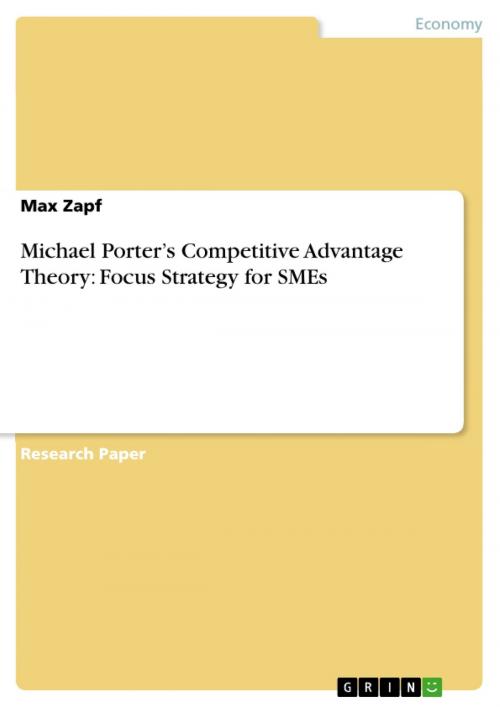Michael Porter's Competitive Advantage Theory: Focus Strategy for SMEs
Business & Finance, Management & Leadership, Management| Author: | Max Zapf | ISBN: | 9783640911363 |
| Publisher: | GRIN Publishing | Publication: | May 9, 2011 |
| Imprint: | GRIN Publishing | Language: | English |
| Author: | Max Zapf |
| ISBN: | 9783640911363 |
| Publisher: | GRIN Publishing |
| Publication: | May 9, 2011 |
| Imprint: | GRIN Publishing |
| Language: | English |
Research Paper (postgraduate) from the year 2008 in the subject Business economics - Business Management, Corporate Governance, grade: A, University of Applied Sciences Chur, course: MSc Entrepreneurship, language: English, abstract: This report was commissioned to examine whether small and medium enterprises (SMEs) that target only a few market segments will promote their products and services more effectively than SMEs that target the mass market. The research draws attention to Porter's generic theory of competitive advantage by mainly concentrating on the third of his competitive advantage strategies, the focus strategy. Theory as well as a practical survey was used in order to falsify or approve the research question. Theory revealed Porter's focus strategy to have several key advantages over a mass market strategy which make firms pursuing such a strategy more effective in their product promotion efforts. First, a focused firm does not have to devote substantial resources into being all things to all people entailing less expenditure of time and money in comparison to a mass market strategy. Second, empirical evidence was found that customers do value specialized firms due to their focused capabilities. Third, a focused firm is less likely to be overwhelmed by great amount of different customer request and is more likely to identify and adapt to market changes in a quick time manner. Besides the advantages of a focus strategy, the research question is only supported when the SME makes bigger rivals to accommodate their existence in the segment(s) by creating circumstances in which the cost for the bigger rival in fighting the SME exceeds the cost of accommodating the SME. 27 SMEs from South Germany have returned completed questionnaires which were used to find practical evidence for answering the research question. Results revealed several tendencies which partly support theory. First, SMEs that pursue a focus strategy are more likely to do this with a differentiation focus and secondly and most importantly they tend to have fewer problems in attracting and retaining customers. There was no indication that focused SMEs are more likely to see and adapt to market changes on an early stage and there was also no tendency visible whether SMEs with a focus strategy are less likely to be overwhelmed with customer requests. In conclusion, theory supports the research question only when the firm is able to adequately implement the focus strategy.
Research Paper (postgraduate) from the year 2008 in the subject Business economics - Business Management, Corporate Governance, grade: A, University of Applied Sciences Chur, course: MSc Entrepreneurship, language: English, abstract: This report was commissioned to examine whether small and medium enterprises (SMEs) that target only a few market segments will promote their products and services more effectively than SMEs that target the mass market. The research draws attention to Porter's generic theory of competitive advantage by mainly concentrating on the third of his competitive advantage strategies, the focus strategy. Theory as well as a practical survey was used in order to falsify or approve the research question. Theory revealed Porter's focus strategy to have several key advantages over a mass market strategy which make firms pursuing such a strategy more effective in their product promotion efforts. First, a focused firm does not have to devote substantial resources into being all things to all people entailing less expenditure of time and money in comparison to a mass market strategy. Second, empirical evidence was found that customers do value specialized firms due to their focused capabilities. Third, a focused firm is less likely to be overwhelmed by great amount of different customer request and is more likely to identify and adapt to market changes in a quick time manner. Besides the advantages of a focus strategy, the research question is only supported when the SME makes bigger rivals to accommodate their existence in the segment(s) by creating circumstances in which the cost for the bigger rival in fighting the SME exceeds the cost of accommodating the SME. 27 SMEs from South Germany have returned completed questionnaires which were used to find practical evidence for answering the research question. Results revealed several tendencies which partly support theory. First, SMEs that pursue a focus strategy are more likely to do this with a differentiation focus and secondly and most importantly they tend to have fewer problems in attracting and retaining customers. There was no indication that focused SMEs are more likely to see and adapt to market changes on an early stage and there was also no tendency visible whether SMEs with a focus strategy are less likely to be overwhelmed with customer requests. In conclusion, theory supports the research question only when the firm is able to adequately implement the focus strategy.















